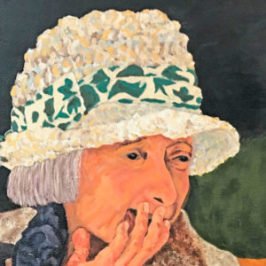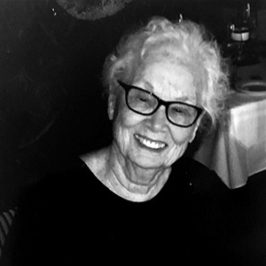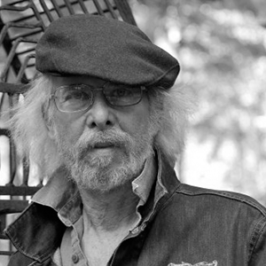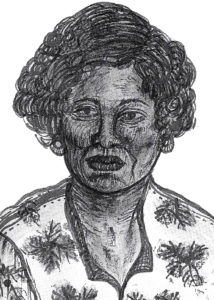
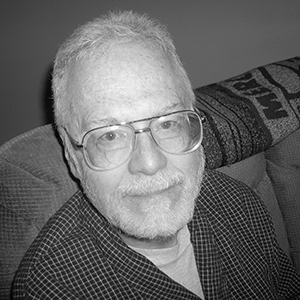
Cooking and expectation, with pieces by Maureen Hossbacher, Jim Taylor and Larnell Custis Butler.
7 minutes
TRANSCRIPT
On this edition, some pieces about food.
Some people don’t like hosting Thanksgiving dinner — not because they don’t like to cook, not because they don’t like company, but because their standard for getting the house clean enough for company is so high that it’s just not worth it. Maureen Hossbacher said that when she gets too fussy about how her apartment looks or what she’s serving, she thinks of her mother, who she said “always had her priorities in the right order.” Here’s an excerpt from her essay “Tables.”
[My mother] regarded cooking not as a womanly art but a necessary evil which involved chopping, mixing, lifting, sweating, getting nicked, getting burned, washing up and making garbage. To give Mom her due, she was not, however, a complainer. I never heard her say she hated to cook. Yet in her kitchen she wore soiled house dresses, the curtains were sooty, the sink was greasy. Nothing sparkled. Roaches thrived.In spite of it all, her family managed to thrive on an abundance of her love, meat and potatoes. Also fresh carrots, turnips, parsnips, cabbage and onions whose preparation she would not entrust to commercial processors. Otherwise, she mostly relied on Mr. Birdseye. The most frequently deployed kitchen equipment was the phone. In between gabfests, or planning sessions for club meetings or dinner dances and such, Mom threw things into the oven, or into boiling water and often thought to take them out at the moment of their juicy doneness. If you happened to be present, the dinner would be plunked down in front of you, with no regard for aesthetic presentation (you might first have to clear away the litter of the morning mail, a few pens, rubber bands, earrings and whatnot, to make room for your plate). If you happened not to be present, she’d arrange a plateful that you could heat up whenever you straggled in.
An excerpt from Maureen Hossbacher’s essay “Tables” from Passager’s Winter 2019 issue.
For a lot of families, pie is a required part of Thanksgiving dinner. Jim Taylor said his grandfather, whose leg was crushed in a railroad accident, enjoyed all manner of dessert pies. Those of an older generation, he said, will understand that a wife was expected to bake, even in the July/ August heat. And she would set the pies on the kitchen table to cool or even on the back stoop. That inspired Jim’s poem “The Pies.”
He and his wooden leg
limped to the kitchen
and inspected the oven.
“Bring me this pie,”
he ordered his wife
and she did – with ice cream
and cheese on the side.
A wag, he clacked his false
teeth at table.
Sickened one day,
he took to his bed.
The pies bubbled
and cooled on the cloth;
gravely, they waited
but he nor his leg –
neither came.
“Bring him,” the pies piped.
“He can’t come,” she whined.
“Then give him this message,”
they said and thrust
a dry crust in her hands.
She clumped the stairs.
“They want you,” she whispered.
“No more pies,” he whimpered.
She clumped the stairs.
“He ain’t hungry,” she told them.
“He ain’t hungry,” they mimicked
and showed their sharp teeth
for pies can be cruel when provoked.
“We’ll peel him,” they prattled.
“We’ll cook him,” they chorused
and clattered up the stairs to his room
but found him dead
as the day before yesterday,
so they went to the window
and by two fluttered off
like great butterflies
that fly south for the winter.
Leg in a corner,
teeth in a jar
and the pies,
the pies are no more.
“The Pies.” Jim Taylor. From Passager’s 2017 Poetry Contest issue.
We’ll end this edition of Burning Bright with a poem not about but in the spirit of Thanksgiving. It’s by Larnell Custis Butler. Larnell used to sit in a park in her neighborhood and sketch the people she saw. Then she’d write poems about the lives she imagined them to have. Here’s one of those poems, “At Big Mama’s House, There is the Power of Love in the Cooking Pot.”
Big Mama is a sacred spirit
In our urban neighborhood.
She is the color of BLACK PIEDMONT
COAL, heavy in weight but never
Burdensome to bear in one’s heart.
Big Mama wears the fragrances of
“Lord have mercy” collard greens or
“Thank you, Jesus” chicken-backs stew.
Big Mama is a friend to everyone.
Her house is a place where
Poor Black people do feel the
Supernatural Divine Love of God
In food served at a dinner table
For the least of God’s children.
Larnell Custis Butler’s poem “At Big Mama’s House, There is the Power of Love in the Cooking Pot” from her book Improvise in the Amen Corner.
To buy Improvise in the Amen Corner, subscribe to or learn more about Passager and its commitment to writers over 50, go to passagerbooks.com. You can download Burning Bright from Spotify, Apple and Google Podcasts, and various other podcast apps.
For Kendra, Mary, Christine, Rosanne, and the rest of the Passager staff, I’m Jon Shorr.


